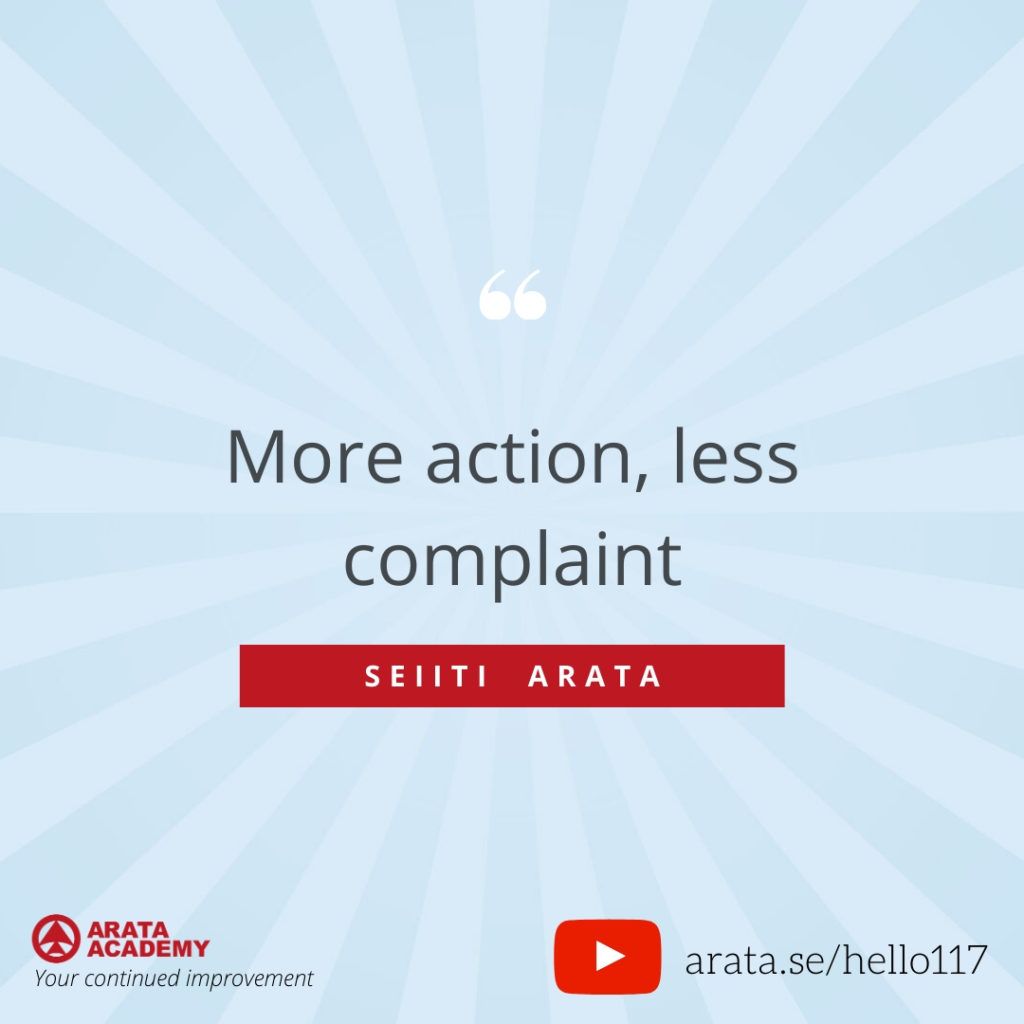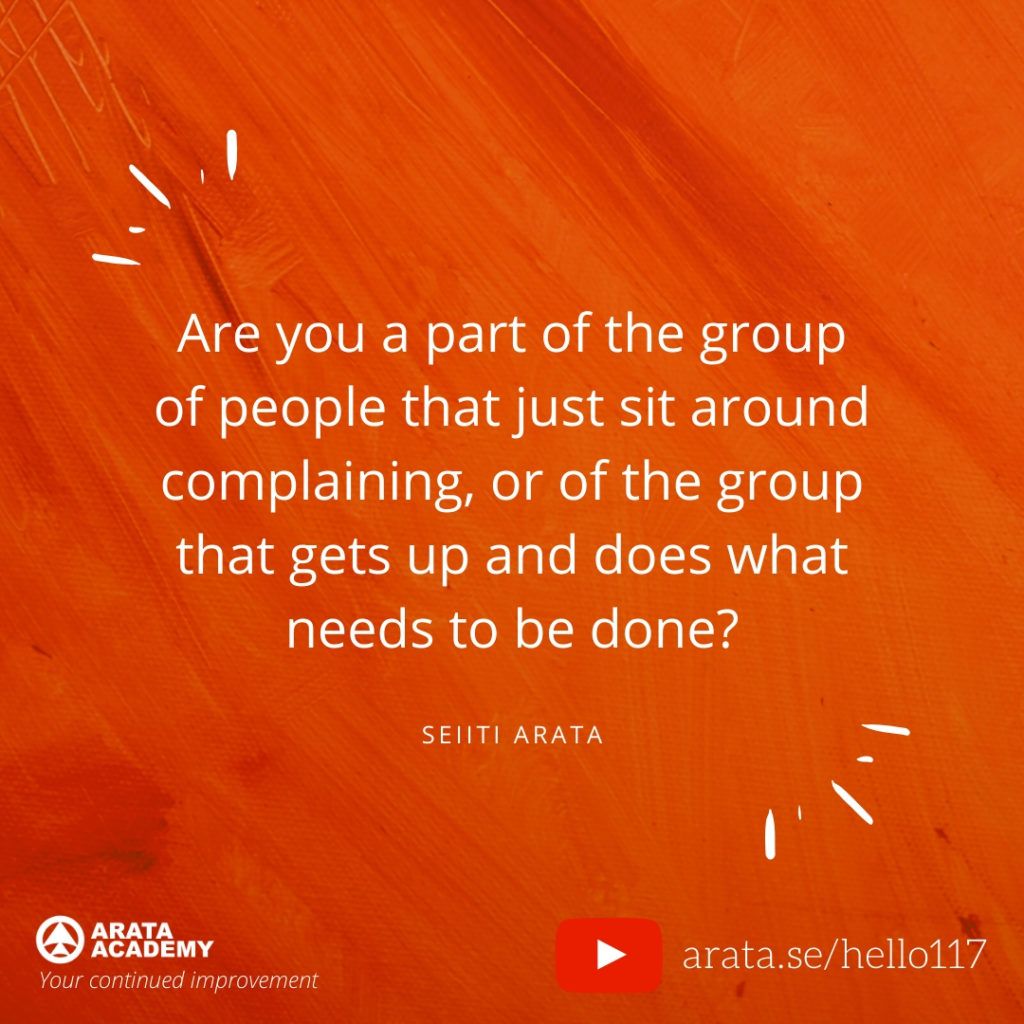Hello! Seiiti Arata. If I could give you some friendly advice that would change your life instantly, I’d say stop complaining and start acting.
It may seem like simple advice, but if you really try to put it into practice, you will see how difficult it is to go a whole day without complaining.
A lot of people fail to stop complaining. The main reason for not being able to stop grumbling is that most people just try to eliminate the bad habit of complaining. Just eliminating the habit of complaining is no use, since it’s necessary to replace the unwanted habit with other, better behaviour.
No matter how hard people try to stop complaining, life will continue to present different kinds of situations. Many of these situations can be unpleasant. If someone has committed themselves solely to not complaining, what happens? They end up suffering because they’re forcing themselves to keep quiet. They start to feel more and more unsatisfied until they reach breaking point and their habit of complaining comes back in full force.
So the secret to minimising your complaints is to substitute the undesirable behaviour for something else. You must swap the habit of complaining with the habit of acting.
With this simple change of focus, you stop focusing on what is wrong and focus on the solution. You begin to direct your attention to what you really want. This will change your reality.
Your focus determines your reality.
Have you noticed that when you’re focused on something, you start to see it everywhere?

For example, when you’re thinking about buying a car and have already chosen the model you want to buy. Suddenly, it’ll seem like everywhere you look, you’ll see that car.
Did everyone suddenly decide to buy the same car as you?
Clearly not. It’s not that there’s any more of this kind of car on the road, it’s just that your focus has changed. As your attention is directed to that car model, you begin to notice it more, even though it was always there.
This phenomenon has a name: reticular formation. A part of the brain stem that differentiates the relevant stimuli from irrelevant stimuli. What do we mean by stimuli?
Our reality is rich in stimuli. There are different sounds, smells, people, movements around us all the time. Our brain chooses to focus on some of these stimuli and ignore others. That’s why you’re able to talk to a person in a noisy environment, for example.
Why is this concept of selective focus important to be understood? When you complain, you are negatively influencing your reality. When you complain, your selective focus is directed to the wrong place. Your focus is on what’s missing, what’s problematic, what you don’t like.
Focusing on complaining will only allow you to experience what you’re complaining about. Just like the example of the car, you start to see what you don’t like everywhere.
This happens, for example, to people that obsess over politics and who spend their time arguing with those who have a different political point of view. Everywhere that person looks, they find something that they don’t agree with, and therefore blame their political enemies.

This can start to get pathological, to the point that it becomes impossible to have a conversation for longer than five minutes with that person, without them starting to go on about politics again. Why do they do it? Let’s use a little empathy to understand the perspective of others. That boring person who just keeps complaining believes that they can only improve the situation by complaining.
If I don’t complain, nothing will improve!
If you ask someone to stop complaining, the first objection you will hear is this: “If I don’t complain, nothing will improve.”
Is this really true? Or is it just a false belief?
When we come across something we would like to change, the only way to improve the situation is by acting upon it.
The only thing is that acting takes work. So instead of acting, we just complain. By having this false belief, we fool ourselves into thinking that we’re acting.
Our complaints won’t change anything unless they’re accompanied by an action. Without a sincere intention to implement actions, complaining is just a kind of outburst. A whimper, a cry whose only practical effect is a sense of momentary relief.
When we complain, we may have the false impression that we’re doing something to change reality. But the reality will remain the same, because the claim alone is devoid of action. We must act, not just complain.
I perfectly understand the anguish of the person who, because they don’t see any alternatives, believes that we have to complain so that things improve. Everyone ends up doing this over and over again.
But the truth is that things will only improve from positive actions. From constructive attitudes led by people who aren’t just complaining. By people who make change happen.
Are you a complainer or a doer?
Imagine people being divided into two groups. Those who complain more than they act. And those who act more than complain.
Which group would you want to join? The group of people that complain, or the one of people that carry out the actions they need to?
Perhaps you have the impression that you’re part of the group of people who act more than they complain. But take a minute to think about whether or not this impression is true.
For you to approach the truth, it’s necessary to make an honest self-assessment of your behaviour. Here are four ways you can assess yourself:
First question: Think about the last seven days. How many conversations did you have with relatives, friends and co-workers in which the main theme was some kind of complaint? And in those same seven days, how many concrete and specific actions did you take to resolve the issues that bothered you?
Second question: Take a look at your social networks. See how many messages you’ve sent where you’re just complaining. Now see how many messages you’re sharing solutions in.
Third question: Increase your awareness to evaluate the conversations you have with yourself, in your head. Is your mind usually satisfied, thanking you for what you do? Or do you just complain and focus on what you can’t do?

Fourth question: How much of your time have you devoted to complaints? And how much time have you taken to acting to improve the subject of your complaints?
When we begin to ask more objective questions like these, it begins to be clear which group of people we belong to.
There’s no such thing as someone who only complains. Nor anyone who is always in action, without ever complaining. What matters here is what you do most of the time. What matters is whether the standard state of your mind is action or complaint.
A common confusion is what it means to complain or to act. For example, if a co-worker interrupts you constantly, you need to talk directly to that colleague and make the request not to be interrupted. When you ask for your colleague’s behaviour change, you’re not complaining. You’re acting. However, if you keep complaining to your neighbor about having a coworker who gets in the way, that’s not acting. It’s just complaining.
Just complaining isn’t acting. This is a false idea, reinforced by social validation.
Complaining is contagious
There is a common game in social relations. The game of who can complain the most.
Let me give you an example of how it works. Going back to the previous example, imagine that I have a co-worker who gets on my nerves. But I don’t ask him to change their behaviour. That is, I didn’t act. Instead, I talk to my neighbors and say something like, “You have no idea what happened to me today …”
And then I spend 10 minutes complaining about how my co-worker is an inconvenient person.
After I finish my complaining monologue, my friends will agree to me saying that what I actually told is absurd. They validate my complaint.
And this is when the complaint relay begins. As soon as everyone finishes agreeing to my story, an exchange takes place. It’s as if the person understands “Oops, now it’s my turn to complain!” and go on, saying, “You think that that’s absurd? Just wait until you hear what happened to me …”

This relay continues, always with one complaining and the others validating. There are many circles of friendships in which the only thing that unites people is this game of complaint.
What’s worse: if you try to break the vicious cycle anyway, you get scolded by the group. How ironic: they complain when you suggest to stop complaining. It’s a violation of a social norm that someone in the group says to stop complaining.
The reason is that the dynamics of this type of relationship involves relaying complaints, not solutions. That’s why we’re together here, talking about how important it is to stop complaining.
Stop complaining and start acting
With everything we’ve talked about so far, you’ve already understood that you don’t want to waste your focus on actions you have no control over.
Want to stop complaining and start acting? If so, it’s critical that you develop the ability to understand the difference between what you control and what you can’t control.
In relation to things you can’t control, you must be mature enough to accept reality as it is.
As for the things you have some control over, you have the responsibility to stop complaining, roll up your sleeves, and start acting to change the situation.
If you can do something about it, then instead of sitting around grumbling, do something to change what needs to be changed. Take responsibility and make it happen.
The world is already filled with people who just complain. What the world desperately needs is people who are willing to get their hands dirty and solve problems.
Stop playing the victim and stop being a reactive person. Take on the role of protagonist and put yourself in control of your own life.
This is personal development, it’s maturity, it’s getting rid of attachment, fear, victimisation.
How will you use your time from now on?
How can you move from the group of people who complain about everything, to the group of people who act? It’s simple: just take more time for action than for complaint.
When you realise that you’re wanting to complain about something, ask yourself: what can be done to improve? What are the alternatives? How can I contribute with a solution? How can I create something that will make reality better? Who should I call and what should I say to them?
This is a much more positive and healthy focus.
Try to go a whole week without complaining. A week without saying that you can’t do this, that you don’t like that, that you don’t know how to do something. Avoid even mentally complaining. Stop for a few seconds, take a breath and realise that you can rephrase your sentence.
Instead of saying that you hate this or that, say what you prefer. Focus on the positive rather than the negative. Say what you intend to do about it. Replace the complaint with the action.
Whenever you complain, write down the complaint. After a few days, read your notes and choose one of the complaints. Start thinking about solutions to solve this.
Once you stop complaining, you begin to find more abundance in your life. Your actions become oriented toward building a better life. And you begin to feel in control of your own life.
Stopping complaining and starting to act is a change of attitude that can transform your life in a very short time.
With this new attitude, you can immediately stop being a fragile and reactive person and become someone strong and proactive. You can become someone who knows they’re on the right track, even in the face of unwanted situations. You know you’re doing what needs to be done.
You will never reach a time when everything in your life is perfect. Life is full of challenges, pains, frustrations. Wanting to eliminate all this is something absolutely beyond your control. But the way you look at life’s problems depends on you. You can choose to develop as a person and become greater than these problems.
To learn how to do this following the orientation of our Personal Development course, I invite you to attend a special class on how to achieve improvements in your life starting with yourself, by clicking here: https://arata.se/personaldevelopment

